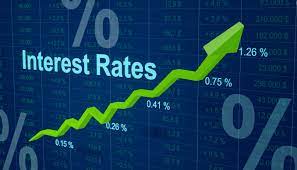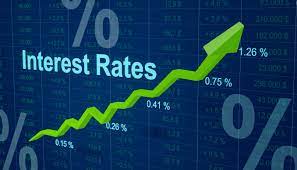
On Thursday, central banks across Europe hiked interest rates, a few by rates that shocked markets, and hinted at much higher borrowing costs to come in order to manage skyrocketing inflation, which is eroding savings and squeezing corporate profits.
Inflation has spread to everything from food to services, with double-digit rates in certain parts of the continent, originally fueled by surging oil costs in the aftermath of Russia's invasion of Ukraine.
Such levels have not been seen in certain areas since the aftermath of the 1970s oil crisis.
The Swiss National Bank and the National Bank of Hungary both surprised markets with large rate hikes just hours after the Federal Reserve raised rates by the most in nearly three decades.
Meanwhile, the Bank of England raised borrowing costs by the quarter point that markets had predicted. The steps come just a day after the European Central Bank agreed in an emergency meeting to keep borrowing costs in the bloc's south under control, allowing it to proceed with rate hikes in both July and September.
"We are in a new era for central banks, where lowering inflation is their only objective, even at the expense of financial stability and growth," George Lagarias, Chief Economist at Mazars Wealth Management said.
The greatest swings of the day occurred in Switzerland, where the SNB raised its policy rate to -0.25 per cent from -0.75 per cent, a change so significant that no analyst polled by the media predicted it.
The first SNB boost since 2007 is unlikely to be the last, and the bank could exit negative territory this year, according to some experts.
"The new inflation forecast shows that further increases in the policy rate may be necessary in the foreseeable future," SNB Chairman Thomas Jordan told a news conference.
The Swiss franc gained over 1.8 per cent against the euro as a result of the decision, and was on track for its greatest daily increase since January 2015, when the SNB decoupled the franc from its euro peg.
In London, the Bank of England was more cautious, but indicated it was prepared to act "forcefully" to avert the dangers posed by inflation rates above 11 per cent. The Bank of England hiked borrowing prices for the seventh time since December, and the British benchmark rate is currently at its highest level since January 2009.
However, three of the nine rate setters opted for a larger, 50 basis point hike, implying that the bank will be under pressure to keep hiking rates even as economic growth slows dramatically.
"Central bankers are teetering along a tightrope, with the biggest concern that raising rates too quickly could tip economies into recession," Maike Currie, Investment Director for Personal Investing at Fidelity International said.
"Monetary policy tightening is a very blunt tool to manage a very precarious situation."
Despite the boost, sterling sank quickly, as some market participants had expected a larger move given the Fed's 75 basis point hike the night before. However, a lower currency means higher imported inflation and more pressure to boost interest rates.
The pound was last trading at $1.2085 per dollar, down three-quarters of a percent on the day.
Meanwhile, in Budapest, the Hungarian central bank unexpectedly hiked its one-week deposit rate by 50 basis points to 7.25 per cent at a weekly tender, attempting to curb stubbornly growing inflation, which is currently in the double digits.
The bank's deputy governor, Barnabas Virag, stated that the increase was far from the final and that the bank would continue its rate hike cycle with "predictable and decisive" measures until it saw evidence of inflation peaking, most likely in the autumn.
The increase also comes as the country's currency has lost about 7% of its value this year, raising inflation through increased import prices.
(Source:www.economictimes.com)
Inflation has spread to everything from food to services, with double-digit rates in certain parts of the continent, originally fueled by surging oil costs in the aftermath of Russia's invasion of Ukraine.
Such levels have not been seen in certain areas since the aftermath of the 1970s oil crisis.
The Swiss National Bank and the National Bank of Hungary both surprised markets with large rate hikes just hours after the Federal Reserve raised rates by the most in nearly three decades.
Meanwhile, the Bank of England raised borrowing costs by the quarter point that markets had predicted. The steps come just a day after the European Central Bank agreed in an emergency meeting to keep borrowing costs in the bloc's south under control, allowing it to proceed with rate hikes in both July and September.
"We are in a new era for central banks, where lowering inflation is their only objective, even at the expense of financial stability and growth," George Lagarias, Chief Economist at Mazars Wealth Management said.
The greatest swings of the day occurred in Switzerland, where the SNB raised its policy rate to -0.25 per cent from -0.75 per cent, a change so significant that no analyst polled by the media predicted it.
The first SNB boost since 2007 is unlikely to be the last, and the bank could exit negative territory this year, according to some experts.
"The new inflation forecast shows that further increases in the policy rate may be necessary in the foreseeable future," SNB Chairman Thomas Jordan told a news conference.
The Swiss franc gained over 1.8 per cent against the euro as a result of the decision, and was on track for its greatest daily increase since January 2015, when the SNB decoupled the franc from its euro peg.
In London, the Bank of England was more cautious, but indicated it was prepared to act "forcefully" to avert the dangers posed by inflation rates above 11 per cent. The Bank of England hiked borrowing prices for the seventh time since December, and the British benchmark rate is currently at its highest level since January 2009.
However, three of the nine rate setters opted for a larger, 50 basis point hike, implying that the bank will be under pressure to keep hiking rates even as economic growth slows dramatically.
"Central bankers are teetering along a tightrope, with the biggest concern that raising rates too quickly could tip economies into recession," Maike Currie, Investment Director for Personal Investing at Fidelity International said.
"Monetary policy tightening is a very blunt tool to manage a very precarious situation."
Despite the boost, sterling sank quickly, as some market participants had expected a larger move given the Fed's 75 basis point hike the night before. However, a lower currency means higher imported inflation and more pressure to boost interest rates.
The pound was last trading at $1.2085 per dollar, down three-quarters of a percent on the day.
Meanwhile, in Budapest, the Hungarian central bank unexpectedly hiked its one-week deposit rate by 50 basis points to 7.25 per cent at a weekly tender, attempting to curb stubbornly growing inflation, which is currently in the double digits.
The bank's deputy governor, Barnabas Virag, stated that the increase was far from the final and that the bank would continue its rate hike cycle with "predictable and decisive" measures until it saw evidence of inflation peaking, most likely in the autumn.
The increase also comes as the country's currency has lost about 7% of its value this year, raising inflation through increased import prices.
(Source:www.economictimes.com)





